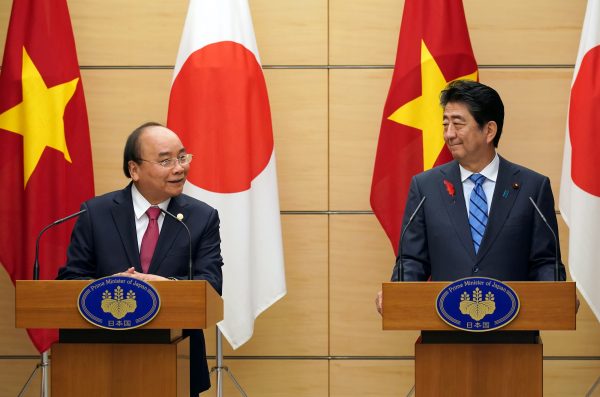Indeed, Vietnam–Japan ties have reached new heights thanks to Abe’s diplomatic activism.
Acknowledging Vietnam’s importance in Japan’s Asia Pacific foreign policy, Abe made special efforts to institutionalise bilateral cooperation. During his first stint from 2006 to 2007, Abe signed the Japan–Vietnam strategic partnership agreement. Upon his return to power in December 2012, Hanoi was chosen as the first stop on his 2013 Southeast Asia tour. One year after the visit, owing to Abe’s push for enhanced defence and security ties, the Japanese prime minister and then-Vietnamese president Truong Tan Sang upgraded bilateral relations to an extensive strategic partnership.
Vietnam–Japan strategic cooperation is being further elevated under Abe’s flagship Free and Open Indo-Pacific (FOIP) strategy. This has three dimensions: promoting rule of law and freedom of navigation, contributing to peace and security through capacity-building and advancing economic prosperity and connectivity through infrastructure.
Throughout Abe’s tenure, Japan zealously backed Hanoi’s proactive diplomacy in pressing regional and international matters. To Abe, Japan and Vietnam are ‘connected by free ocean’ and the two should collaborate in supporting the regional rules-based order. Amid China’s growing assertive posture, Japan has endorsed Vietnam’s stance on dispute management in the South China Sea and underscored the importance of upholding international law.
Tokyo has also demonstrated its willingness to assist Hanoi in maritime law enforcement capacity-building. Following the 2014 Haiyang Shiyou 981 crisis, Japan offered Vietnam six coast-guard vessels to boost the Southeast Asian country’s ability to defend its waters. In 2016, Abe pledged six brand new patrol ships for the Vietnam Coast Guard and Japan recently inked a US$345 million loan agreement to realise the promise.
There is room to further strengthen ties in this area, as China’s ambitions in the South China Sea remain a serious, shared concern. To advance Abe’s FOIP initiative, Japan’s new Suga government must continue to expand naval and maritime security cooperation with Vietnam.
Abe was highly committed to providing official development assistance (ODA) for Vietnam, both in words and in deeds. From 2014 to 2018, Japan granted approximately US$280 million in ODA to assist infrastructure development, human resource management and environmental and governance practices in Vietnam. Japan is currently Vietnam’s number one ODA donor.
Japanese direct investment is also on the rise, with Vietnam a priority destination under Japan’s Partnership for Quality Infrastructure Initiative. Capitalising on Japan-funded projects, Vietnam is exploring an alternative to China’s loans, which have been received hesitantly.
As advocates of enhanced regional economic connectivity, Hanoi and Tokyo worked closely together on the Comprehensive and Progressive Agreement for Trans-Pacific Partnership (CPTPP) at the 2017 APEC Summit. Abe’s leadership was pivotal in reviving the deal following US withdrawal, and many speculate that Vietnam is poised to become the biggest winner of the trade pact.
People-to-people exchange has also been promoted with great enthusiasm. During his third trip to Vietnam, Abe visited Vietnam Japan University, where he remarked that the institution is a bridge linking the two countries. Launching its first academic year in 2016, the university aims to provide Vietnamese students with internship and job opportunities in Japanese firms. In an interview, Abe talked about the Japanese people’s admiration for the industrious and warm-hearted Vietnamese, who have an affinity for his country’s language and culture.
Vietnam has become the largest source of skilled immigration to Japan — in 2018 alone, Vietnam dispatched nearly 70,000 trainees. Early this year, the two countries agreed to raise the number of Vietnamese workers in Japan.
But Vietnam–Japan engagement under Abe was not without controversy. There have been reports of Japanese employers mistreating technical interns from Vietnam and other countries. Last year, three Vietnamese trainees sued a Japanese construction company for forcing them to perform unsafe nuclear decontamination work. Japan’s soft power in Vietnam will be damaged if such practices continue. Abe’s successor Yoshihide Suga and other leaders must strive to ensure safe working conditions for foreigners in Japan.
While Abe’s sudden departure might cause some disruptions in the broader Indo-Pacific theatre, the trajectory of Vietnam–Japan relations is unlikely to deviate. One thing is certain: Vietnam will miss Abe, who has left a good impression in the minds of its leaders and people. To continue Abe’s legacy in Vietnam, Prime Minister Suga will need to keep up the momentum in all areas of cooperation and forge a close personal rapport with Hanoi.
Xuan Dung Phan is a graduate research student at S Rajaratnam School of International Studies (RSIS), Nanyang Technological University, Singapore.

